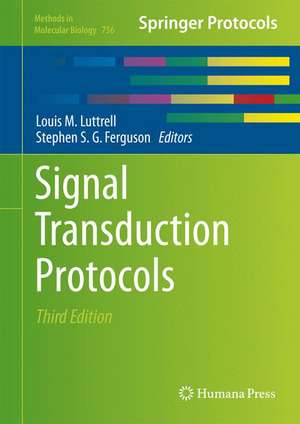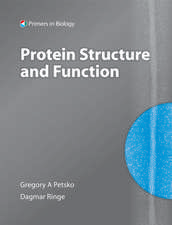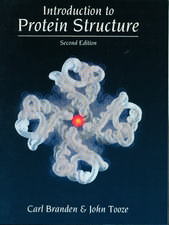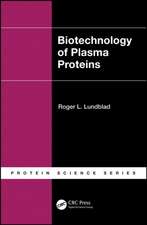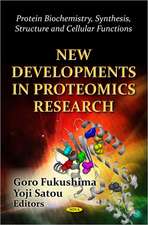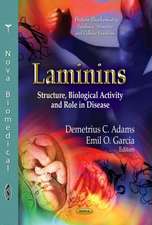Signal Transduction Protocols: Methods in Molecular Biology, cartea 756
Editat de Louis M. Luttrell, Stephen S. G. Fergusonen Limba Engleză Hardback – 30 aug 2011
Authoritative and accessible, Signal Transduction Protocols serves as an ideal guide to scientists of all backgrounds and is a valuable resource for future progress in the field of signal transduction research.
| Toate formatele și edițiile | Preț | Express |
|---|---|---|
| Paperback (1) | 709.44 lei 6-8 săpt. | |
| Humana Press Inc. – 23 aug 2016 | 709.44 lei 6-8 săpt. | |
| Hardback (1) | 960.78 lei 6-8 săpt. | |
| Humana Press Inc. – 30 aug 2011 | 960.78 lei 6-8 săpt. |
Din seria Methods in Molecular Biology
- 9%
 Preț: 791.63 lei
Preț: 791.63 lei - 23%
 Preț: 598.58 lei
Preț: 598.58 lei - 20%
 Preț: 882.98 lei
Preț: 882.98 lei -
 Preț: 252.05 lei
Preț: 252.05 lei - 5%
 Preț: 802.70 lei
Preț: 802.70 lei - 5%
 Preț: 729.61 lei
Preț: 729.61 lei - 5%
 Preț: 731.43 lei
Preț: 731.43 lei - 5%
 Preț: 741.30 lei
Preț: 741.30 lei - 5%
 Preț: 747.16 lei
Preț: 747.16 lei - 15%
 Preț: 663.45 lei
Preț: 663.45 lei - 18%
 Preț: 1025.34 lei
Preț: 1025.34 lei - 5%
 Preț: 734.57 lei
Preț: 734.57 lei - 18%
 Preț: 914.20 lei
Preț: 914.20 lei - 15%
 Preț: 664.61 lei
Preț: 664.61 lei - 15%
 Preț: 654.12 lei
Preț: 654.12 lei - 18%
 Preț: 1414.74 lei
Preț: 1414.74 lei - 5%
 Preț: 742.60 lei
Preț: 742.60 lei - 20%
 Preț: 821.65 lei
Preț: 821.65 lei - 18%
 Preț: 972.30 lei
Preț: 972.30 lei - 15%
 Preț: 660.49 lei
Preț: 660.49 lei - 5%
 Preț: 738.41 lei
Preț: 738.41 lei - 18%
 Preț: 984.92 lei
Preț: 984.92 lei - 5%
 Preț: 733.29 lei
Preț: 733.29 lei -
 Preț: 392.60 lei
Preț: 392.60 lei - 5%
 Preț: 746.26 lei
Preț: 746.26 lei - 18%
 Preț: 962.66 lei
Preț: 962.66 lei - 23%
 Preț: 860.22 lei
Preț: 860.22 lei - 15%
 Preț: 652.64 lei
Preț: 652.64 lei - 5%
 Preț: 1055.50 lei
Preț: 1055.50 lei - 23%
 Preț: 883.87 lei
Preț: 883.87 lei - 5%
 Preț: 1141.13 lei
Preț: 1141.13 lei - 19%
 Preț: 491.89 lei
Preț: 491.89 lei - 5%
 Preț: 1038.86 lei
Preț: 1038.86 lei - 5%
 Preț: 524.16 lei
Preț: 524.16 lei - 18%
 Preț: 2122.34 lei
Preț: 2122.34 lei - 5%
 Preț: 1299.23 lei
Preț: 1299.23 lei - 5%
 Preț: 1339.12 lei
Preț: 1339.12 lei - 18%
 Preț: 1390.26 lei
Preț: 1390.26 lei - 18%
 Preț: 1395.63 lei
Preț: 1395.63 lei - 18%
 Preț: 1129.65 lei
Preț: 1129.65 lei - 18%
 Preț: 1408.26 lei
Preț: 1408.26 lei - 18%
 Preț: 1124.92 lei
Preț: 1124.92 lei - 18%
 Preț: 966.27 lei
Preț: 966.27 lei - 5%
 Preț: 1299.99 lei
Preț: 1299.99 lei - 5%
 Preț: 1108.51 lei
Preț: 1108.51 lei - 5%
 Preț: 983.76 lei
Preț: 983.76 lei - 5%
 Preț: 728.16 lei
Preț: 728.16 lei - 18%
 Preț: 1118.62 lei
Preț: 1118.62 lei - 18%
 Preț: 955.25 lei
Preț: 955.25 lei - 5%
 Preț: 1035.62 lei
Preț: 1035.62 lei
Preț: 960.78 lei
Preț vechi: 1171.68 lei
-18% Nou
Puncte Express: 1441
Preț estimativ în valută:
183.84€ • 200.33$ • 154.92£
183.84€ • 200.33$ • 154.92£
Carte tipărită la comandă
Livrare economică 23 aprilie-07 mai
Preluare comenzi: 021 569.72.76
Specificații
ISBN-13: 9781617791598
ISBN-10: 1617791598
Pagini: 400
Ilustrații: XIV, 430 p.
Dimensiuni: 178 x 254 x 30 mm
Greutate: 0.89 kg
Ediția:3rd ed. 2011
Editura: Humana Press Inc.
Colecția Humana
Seria Methods in Molecular Biology
Locul publicării:Totowa, NJ, United States
ISBN-10: 1617791598
Pagini: 400
Ilustrații: XIV, 430 p.
Dimensiuni: 178 x 254 x 30 mm
Greutate: 0.89 kg
Ediția:3rd ed. 2011
Editura: Humana Press Inc.
Colecția Humana
Seria Methods in Molecular Biology
Locul publicării:Totowa, NJ, United States
Public țintă
Professional/practitionerCuprins
Refining Efficacy: Allosterism and Bias in G Protein-Coupled Receptor Signaling.- Imaging-based Approaches to Understanding G Protein-Coupled Receptor Signaling Complexes.- Improving Drug Discovery with Contextual Assays and Cellular Systems Analysis.- RGS-insensitive Ga Subunits: Probes of Ga Subtype-selective Signaling and Physiological Functions of RGS Proteins.- Bioinformatic Approaches to Metabolic Pathways Analysis.- Studying Ligand Efficacy at G Protein-Coupled Receptors Using FRET.- Using BRET to Detect Ligand-Specific Conformational Changes in Preformed Signaling Complexes.- Reconstitution of G Protein-Coupled Receptors into a Model Bilayer System: Reconstituted High Density Lipoprotein Particles (rHDL).- Using Quantitative BRET to Assess G Protein-Coupled Receptor Homo- and Hetero-Dimerization.- Cell-Surface Protein-Protein Interaction Analysis with Time-Resolved FRET and Snap-tag Technologies: Application to G Protein-Coupled Receptor Oligomerization.- Analysis of GPCR/Ion Channel Interactions.- Multicolor BiFC Analysis of G Protein bg Complex Formation and Localization.- Real-Time BRET Assays to Measure G Protein/Effector Interactions.- Luminescent Biosensors for Real-Time Monitoring of Intracellular cAMP.- Simultaneous Real Time Imaging of Signal Oscillations Using Multiple Fluorescence-Based Reporters.- Using FRET-based Reporters to Visualize Subcellular Dynamics of Protein Kinase A Activity.- Genetically Encoded Fluorescent Reporters to Visualize Protein Kinase C Activation in Live Cells.- Visualizing Receptor Endocytosis and Trafficking.- Investigating G Protein-Coupled Receptor Endocytosis and Trafficking by TIR-FM.- Visualizing G Protein-Coupled Receptor Signalsomes Using Confocal Immunofluorescence Microscopy.- Detection and Characterization of Receptor Interactions with PDZ Domains.- Tandem Affinity Purification and Identification of Heterotrimeric G-Protein Associated Proteins.- Study of G Protein-Coupled Receptor/ßarrestinInteractions within Endosomes Using FRAP.- Disrupting Protein Complexes Using Tat-tagged Peptide Mimics.- Protein-fragment Complementation Assays for Large-Scale Analysis, Functional Dissection and Dynamic Studies of Protein-Protein Interactions in Living Cells.
Recenzii
From the reviews of the third edition:
“This well-illustrated book on signal transduction protocols is a valuable resource for scientists interested in learning the intricate details of complex signaling events that take place within the cell … . Although written for the scientists in the field of signal transduction research, it also will be useful for graduate students and other investigators in pharmacology interested in this area. … Given the rapid advances in the field of signal transduction, this third edition is essential.” (Omer Iqbal, Doody’s Book Reviews, March, 2012)
“This well-illustrated book on signal transduction protocols is a valuable resource for scientists interested in learning the intricate details of complex signaling events that take place within the cell … . Although written for the scientists in the field of signal transduction research, it also will be useful for graduate students and other investigators in pharmacology interested in this area. … Given the rapid advances in the field of signal transduction, this third edition is essential.” (Omer Iqbal, Doody’s Book Reviews, March, 2012)
Textul de pe ultima copertă
It is increasingly clear that signal transduction is a highly organized and integrated process. Divided into two convenient sections, Signal Transduction Protocols, Third Edition focuses on experimental approaches to better understand the complexity of signal transduction. Introductory chapters provide perspective on several of the challenges involved in signal transduction research and offer guidance on selecting the best approaches to various types of questions. The individual chapters provide detailed experimental protocols covering various topics, from the effects of ligand binding on receptor conformation and effector coupling, to moving inside the cell in order to capture the spatial and temporal characteristics of signaling events. Written in the highly successful Methods in Molecular Biology™ series format, chapters contain introductions to their respective topics, lists of the necessary materials and reagents, step-by step, readily reproducible laboratory protocols, and notes on troubleshooting and avoiding known pitfalls.
Authoritative and accessible, Signal Transduction Protocols serves as an ideal guide to scientists of all backgrounds and is a valuable resource for future progress in the field of signal transduction research.
Authoritative and accessible, Signal Transduction Protocols serves as an ideal guide to scientists of all backgrounds and is a valuable resource for future progress in the field of signal transduction research.
Caracteristici
Includes cutting-edge methods and protocols Provides step-by-step detail essential for reproducible results Contains key notes and implementation advice from the experts
